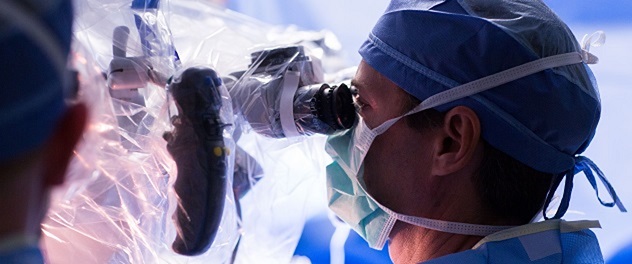
Otology, neurotology and lateral skull base surgery research improves treatment of tumors that affect hearing.
Otology, Neurotology and Skull Base Surgery
Otology, neurotology and lateral skull base surgery research into hearing conditions in the Mayo Clinic Department of Otolaryngology — Head and Neck Surgery's Division of Otology, Neurotology and Skull Base Surgery is centered on three concepts:
- Hearing preservation.
- Hearing restoration.
- Auditory rehabilitation.
Incremental advances in the understanding of the molecular and physiological basis for hearing loss — gained through basic science research and clinical studies — have led to new and improved therapeutic options for patients. These advances are made possible through close collaboration with expert colleagues in areas including:
- Audiology.
- Behavioral neurotology.
- Clinical genetics.
- Internal medicine.
- Neurology.
- Neurophysiology.
- Radiology.
Primary focus areas include vestibular schwannoma, cochlear implantation and molecular genetics pertaining to sensorineural hearing loss.
Vestibular schwannoma
Researchers in the Division of Otology, Neurotology and Skull Base Surgery are finding the best ways to treat vestibular schwannomas, which often negatively affect hearing, balance, facial nerve function and quality of life. The division conducts clinical studies to reveal which clinical presentations may be best suited to the current treatment options of observation, stereotactic radiotherapy or surgery.
Researchers also are developing systemic medical therapies for people with neurofibromatosis 2-associated vestibular schwannomas for whom standard therapies have not worked. Finding targeted therapies that stop the growth of vestibular schwannoma cells in the laboratory may help scientists decide which therapies to advance into the clinical setting.
Hearing rehabilitation
If clinicians cannot preserve or restore patients' hearing, then they must consider hearing rehabilitation options, including:
- Hearing aids.
- Cochlear implants.
- Brainstem implants.
- Hybrid devices — a combination of a cochlear implant and conventional hearing aid.
Researchers have directed significant effort to hearing preservation via cochlear implantation. These efforts include using novel surgical techniques and methods to monitor residual hearing during cochlear implantation, evaluating implantation in very young patients to improve overall performance, and developing methods to streamline cochlear implant care.
Mayo Clinic's cochlear implant team is well established and, under the oversight of the U.S. Food and Drug Administration, is investigating the most advanced devices available. This research is conducted in close collaboration with the Division of Audiology.